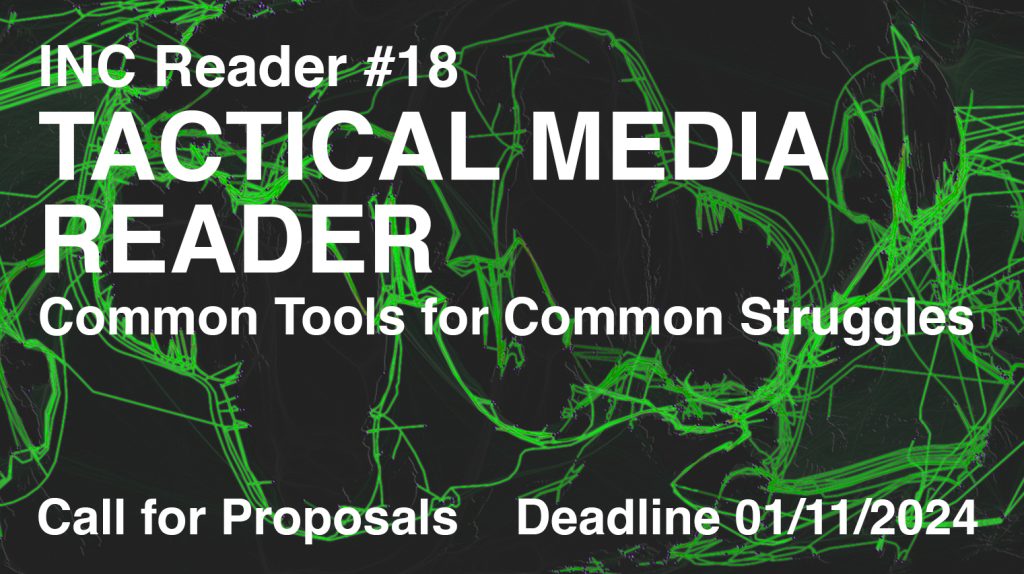
INC Reader #18
Tactical Media Reader
Common Tools for Common Struggles
Edited by Chloë Arkenbout, Tommaso Campagna, Sepp Eckenhaussen and Geert Lovink
Activists, artists, and social movements take on a multitude amount of simultaneous urgencies, from the climate crisis, war, and genocide to housing crises, economic recession, and endemic fake news. We know that these crises are interconnected. There is no global warming without colonialism and no capitalism without patriarchy. Yet, in the complexity of the stack of crises, social struggles often single out a clearly defined issue in which a difference can be made.
In this reader, we will focus on a question that is relevant to all social movements today: how to organize mediated resistance under late (platform) capitalism? Social movements require secure and federated digital tools (social media, coordination channels, publishing infrastructures, repositories, etc.) – for mobilization as well as the development of aesthetics, discourse, and collective memory. But dominant platforms are extractive, restrictive, and often outright repressive… On the other hand, smaller, DIY alternatives, are often fragmented, inaccessible, unstable, short-lived, and thus mostly used by a small group. Communities of organizers, as a result, often don’t manage to share indy infrastructures despite common strategies, tactics, tools, aesthetics, and, most importantly, causes. Despite progress over the past decades in terms of alternatives, we are often still dependent on platforms like Insta, TikTok, YouTube and X. It’s even harder to question the use of Google, Microsoft, and Adobe. Is this also, in part, due to the moral bankruptcy of free software due to its sell-out to Big Tech.
How can we use media in tactical ways today? How do we want to connect music, video, performance, memes, slogans, and visual design and combine it with action and debate, critique, and theory outside of the corporate and state-controlled platforms? Tell us about your seeds, trials, and pilots. How do we like to shape the aesthetics of the techno-social? How can we keep broadcasting glimmers of hope? Is this possible without having to go back to concepts of the past such as community and networks? If we need a diversity of practices and tactics for the many struggles and urgencies we face, can we at least share common (digital) tools? Reacting to this urgency of common tools for common causes, Tactical Media Reader I explores practices and experiments that open up DIY (digital) media tools to multiple communities of activists and counterhegemonic cultural practices.
We ask thinkers, makers and activists to contribute in text, as well as image, video, audio, or other multimedia, about topics including but not limited to:
- Contemporary tactical media practices in (expanded) publishing, zines, streaming, sound and noise, agitprop, web development, digital culture, design, visual art, and related cultural disciplines;
- The role of media in contemporary social movements;
- The tactical dimensions of cultural trends, such as online cosplay, post-irony, and tactical virality;
- The aesthetics of tactical media in the 2020s;
- Stories and reports of digital & cultural tools used in different struggles simultaneously, and the work that had to be done to support this common use;
- Case studies of specific cultural and media tactics that supported or even created solidarity between different groups, communities, or social movements;
- New models of (live) event coverage, throughout distributed channels and locations;
- Designing media tools based on the principle of many tactics in the common struggle;
- Experience-based insight in the benefits and limitations of tactical interventions on the platform and/or the (im)possibility of proprietary platform exodus/boycott/abolishment;
- The building, maintenance, and use of the fediverse;
- Permacomputing and the environmental impact of digital infrastructure.
How to send your proposal
Please send your one-page proposal (300-500 words) to info@networkcultures.org by the 1st of November 2024.
Final text or visual contributions may range from 500 to 5000 words, or, in the case of non-written contributions, from 2 to 14 pages.
The Tactical Media Reader will be published in late 2025.

